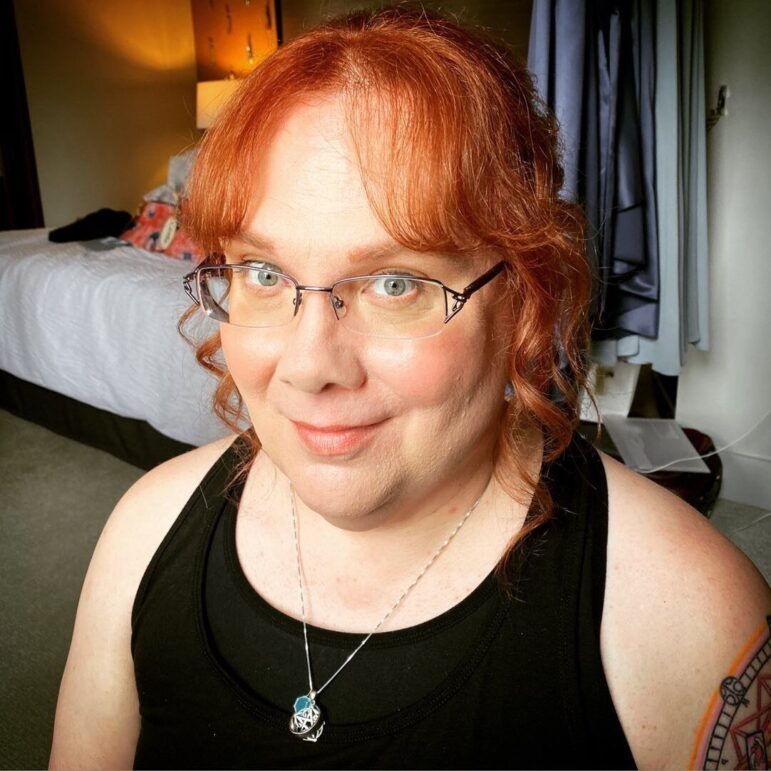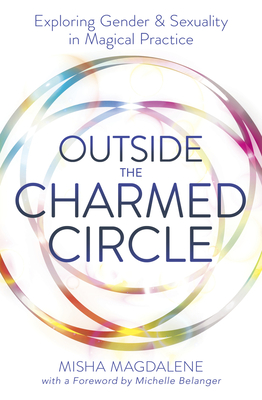
There are a lot of great books on magic, on the history of Paganism, Polytheism, and more – but there are still scant books on magic and gender for those of us who have a fluid or transgender relationship with our identity. In my quest for more, I came across Outside the Charmed Circle: Exploring Gender & Sexuality in Magical Practice by Misha Magdalene, a book for those looking to live as the truest expression of their gendered, sexual, spiritual self.
The sexologist Amy Marsh praised the book as being “page-turning, thought-provoking, a ‘101 and beyond’ user-friendly handbook for magical and social change.” While reading the book, I was impressed by how Magdalene wove and adapted masculine/feminine binaries into something expansive and beyond. Like magic itself, her work felt limitless.
I reached out to Misha to talk more about her journey, her magic, the current state of trans rights in the United States, and more.

Misha Magdalene [courtesy]
THE WILD HUNT: I adore this line from your bio: “multi-classed, multi-geek, multi-queer Witch” – because it reinforces that we are all so many things. Before we talk about your amazing book, Outside The Charmed Circle, can you share a little about your journey with gender and magic?
MISHA MAGDALENE: Thank you so much! Perhaps unsurprisingly, my experiences with magic are entwined with my experiences of gender and sexuality, and for me, all of those intersect with that nebulous, shifting concept we call “queerness.”
I’ve been aware that I was queer in multiple ways since I was quite young — before I’d hit a double-digit age — but I didn’t have the language or conceptual framework to express that idea. As a result, I spent a lot of my childhood and adolescence confused, scared, and lonely, until I first read Starhawk’s The Spiral Dance and Margot Adler’s Drawing Down the Moon, which were the first books on Paganism, polytheism, and magic I’d ever seen.
In those books, I started to learn a vocabulary for speaking about the inner reality I’d been living my whole life, as well as learning about all these magical queer groups that were exploring these spaces that spoke to me: the Radical Faeries, Dianic Witchcraft, the Anderson Feri tradition, and so on. I came to understand there were other people like me, and spaces where we could be our true selves.
From there, I became an eclectic Witch of sorts, and eventually found my way into a British traditional Wiccan coven, which led to reading a lot of interesting books, doing a fair bit of magic, and getting to meet and work with lots of fascinating people – and ultimately, to this interview!
TWH: You’re initiated in both Anderson Feri and Gardnerian Wicca. For me, my work with Feri always feels liberating, like I am the Star Goddess, but Wicca’s gender binary with “Lord and Lady” is more complicated. How have you found symmetry between these traditions to help you build your magical practice?
MM: This is a great question! Feri and Wicca aren’t the same by a long shot, but in my experience, they complement one another in interesting ways. Wicca provides a structural base which gives Feri something solid from which to push off into its flights of wildness, and Feri brings a kind of poetic inspiration to the moonlit Witcheries of Wicca.
Some would say that Feri is intrinsically more queer than Wicca. This idea is rooted in a common perception, even among some Gardnerians, that Gardnerian Wicca is based in a cisgender, heterosexual, boy/girl binary paradigm. To be fair, that isn’t entirely wrong, but it’s also not the whole story. After all, we’re talking about a spiritual tradition with a core text that includes the phrase “all acts of love and pleasure are My rituals,” attributed to the Star Goddess herself. I can’t think of anything more queer than that!
I would suggest that anyone willing to work with the Goddess and God of the Wicca as they truly are might find them a lot more queer than conventional wisdom would have us believe. In that, I think Wicca and Feri do indeed find a kind of queer symmetry, one which makes their complementarity less surprising.
TWH: What led you to start writing about the intersection of magic and gender? Was your Patheos column where it started?
MM: The book actually started as a sort of memoir-like reflection on my own experiences of gender, sexuality, and magical practice, which I submitted to an anthology on queer magic. It wasn’t accepted, but I started developing the concept anyway, hoping it would turn into something. Eventually I used a section from this piece as the writing sample which led to my Patheos column.
On Patheos, I was able to develop both my own writing voice and the discursive space in which led to the core concept for the book, which actually grew out of my work in the Gender, Women, and Sexuality Studies program at the University of Washington, where I got my bachelor’s degree. I’ve been a nerd about magical and devotional practice for years, since well before I was a formal practitioner of any path or tradition, so it was an obvious leap to thinking about those practices through the lens of gender studies, queer theory, and feminist theory.
I realized there was a broad, deep set of conversations to be had in this space, one that mostly wasn’t happening in the wider Pagan, polytheist, and occult communities, and that I might have a contribution to make in that space. That turned into several columns on Patheos with a thread running through them – a thread which, in the end, turned into a book.

Cover to Outside the Charmed Circle by Misha Magdeline [Llewellyn
MM: In many ways, the Patheos column was a kind of “zeroth” draft of the book. It’s where I wound up developing and trial-running a lot of the ideas I was able to further develop and expand in the book. It’s also where I was able to articulate the underlying positions that inform all of my work: that magic is queer and queerness is magic, that our bodies are sacred and belong solely to us, that we all deserve space and acceptance within the big tent of what Laura Tempest Zakroff calls “p-word” spirituality: Pagans, polytheists, and practitioners of numinous, magical spirituality.
When I sat down to write the book itself, I drew on the past columns I’d written, but rather than simply binding them together in a sheaf and calling it a day, I used them as starting points from which to talk about those issues in greater depth. I got to really think about consent in magical praxis, or about the implicit assumptions around ability that are built into our traditions and practices.
Essentially, I wrote the book I wish I’d had when I was a queer little baby Witch in 1980s South Carolina. I wrote it to tell all of us all of us whose sexuality or gender are somewhere under the rainbow that we belong, because magic is queer, too. I also wrote it to help cisgender and heterosexual people understand that we belong here, and that we need them to make space under the big tent of Paganism for us. There’s plenty of room, after all.
Also, I’m a nerd, and I’m especially a nerd about gender, sexuality, and magic. I would cheerfully talk about queer theory, transgender mythology, gay sex magic, and the history of devotional taboo-breaking for hours. Since it’s impossible for me to do that with everyone who’d want to have that conversation with me, I wrote the book instead.
I’d describe the ideal reader as anyone with a body and a lived experience of existing in relation to sexuality and gender—which is all of us—who’s interested in exploring how those things inform, are informed by, and intersect with our experiences of the numinous. If you’re reading these words right now, you’re probably the ideal reader!
TWH: Do you have a vision for a follow up book?
No comment.
Just kidding! I do indeed have a vision for a follow-up book, one which draws on concepts introduced in Outside the Charmed Circle and explores them in what I hope will be a really fun way. More than that, I cannot say. Yet.
TWH: Lastly, as a transgender voice in our spiritual community, with the current climate of hostility in the United States, do you have any wisdom for our readers, especially trans youth, on how to navigate these tower times?
I desperately wish I could say “yes” to this, because these are terrifying times for so many of us, especially for trans POC — in particular Black trans women, who are disproportionately targeted for violence — and for transgender children and adolescents, who are being abused by the very people claiming to “fight for their well-being” by denying their existence and their right to live as themselves. Many places in the world, including the US and the UK, are seeing a rise in transphobic sentiment coupled with a wave of anti-transgender legislation, all of which amounts to an overt attempt at eliminating transgender people altogether, as the recent statements from a far-right commentator at CPAC make explicitly clear.
I wish I could offer some sort of inspirational wisdom, but what I have to offer instead is this:
If you’re trans — whether you’re young or old — things are rough right now, and they’re going to keep being rough for a while. I can’t say how long, because none of us know. What I can say is that it’s okay to do what you need to do to survive. More than okay: it’s right, it’s just, and it’s good. Please, please do what you can to keep yourself safe, and get to a place where you can live your life for yourself and the people you love.
I promise you, there are so many people in the world who care about you and support your right to be the person you know yourself to be. Just hang in there, and use whatever magic you need to get through these days. We’ll get through them together.
I am extremely grateful to have had this opportunity to connect with Misha. Their book, Outside the Charmed Circle: Exploring Gender & Sexuality in Magical Practice is available from Llewelyn. Most importantly, if you are transgender and need support, please reach out to translifeline.org for peer support.
The Wild Hunt is not responsible for links to external content.
To join a conversation on this post:
Visit our The Wild Hunt subreddit! Point your favorite browser to https://www.reddit.com/r/The_Wild_Hunt_News/, then click “JOIN”. Make sure to click the bell, too, to be notified of new articles posted to our subreddit.